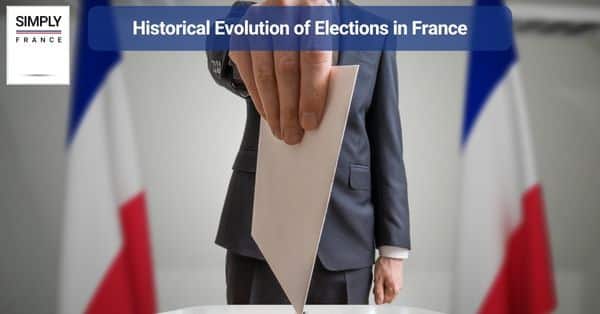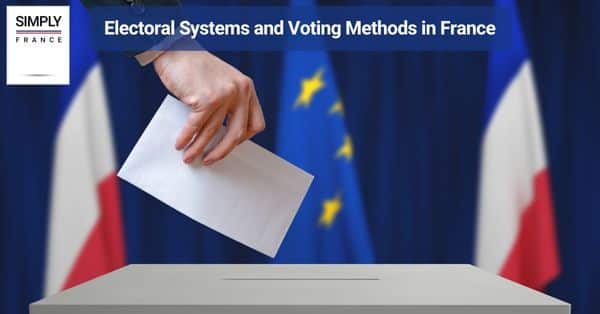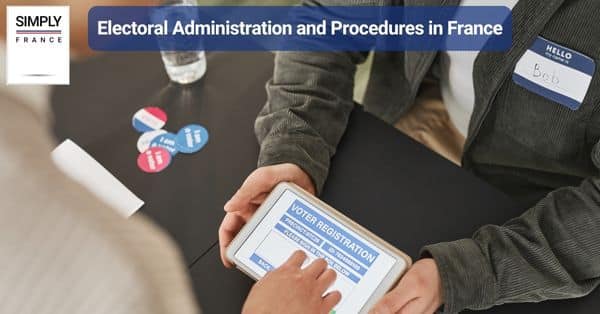France’s electoral system combines proportional representation and majority voting. Presidential elections follow a two-round system, while parliamentary elections utilize a mix of proportional representation and single-member districts. The Constitutional Council oversees the process, and compulsory voter registration is in place.
This article will explore the evolution of elections in France, its current electoral systems and voting methods, electoral administration and procedures, political parties and campaigning, as well as voter rights and participation. Additionally, it will discuss the challenges and reforms that are being proposed to improve the French voting system. By looking at all of these factors together, we can gain a better understanding of how elections in France work.
Historical Evolution of Elections in France
The historical evolution of elections in France is a fascinating journey that reflects the country’s transition from monarchy to democracy. The roots of modern elections can be traced back to the French Revolution of 1789, which abolished absolute monarchy and introduced the concept of popular sovereignty. The revolutionaries implemented the first universal male suffrage system, allowing all adult men to vote, albeit with specific property requirements.
Throughout the 19th and 20th centuries, France experienced a series of political transformations, including the establishment of the First and Second French Republics, the Napoleonic era, and the establishment of the Third French Republic. Each of these periods saw changes in the electoral system, with varying degrees of suffrage expansion and political participation. Women gained the right to vote in France in 1944, following the end of World War II.
Over time, France has refined its electoral processes, seeking to ensure fairness, transparency, and the representation of diverse political opinions. The historical evolution of elections in France showcases the country’s commitment to democratic principles and the ongoing pursuit of an inclusive and participatory electoral system.

Electoral Systems and Voting Methods in France
The French political system is characterized by a mix of direct and indirect democracy. Direct democracy refers to the ability of citizens to vote on policy issues directly. Indirect democracy refers to the power of citizens to elect representatives who will make decisions on their behalf. The French electoral system uses both of these methods.
Presidential Elections
The French President is elected through a two-round direct voting system. In the first round, any candidate who garners at least 500 signatures from elected officials may run. The two candidates with the most votes in the first round advance to a second round of voting. The candidate with the most votes in the second round is then elected as President.
Parliamentary Elections
The French Parliament is divided into two chambers: the National Assembly and the Senate. Members of the National Assembly are elected through a two-round direct voting system. Senators, on the other hand, are elected indirectly by elected officials.
Local Elections
Local elections in France are held every six years. French citizens elect municipal councilors, who in turn elect the mayor of the municipality. The number of councilors elected depends on the population of the municipality.

Electoral Administration and Procedures in France
France is a democratic country with a long history of elections. The country’s electoral system has evolved over the years, and the current system is designed to ensure fair and transparent elections.
The French electoral system is based on universal suffrage, which means that all citizens who are at least 18 years old have the right to vote. The electoral administration and procedures in France are critical components of the country’s electoral process.
The Role of the Constitutional Council
The Constitutional Council is an essential institution in the French electoral process. It is responsible for overseeing elections and ensuring that they are conducted in a fair and transparent manner. The council is made up of nine members appointed by the President of the Republic, the President of the National Assembly, and the President of the Senate.
Voter Registration
To be eligible to vote in French elections, citizens must first register to vote. Voter registration is mandatory, and citizens can register to vote in person, by mail, or online. To register to vote, citizens must provide proof of their identity and residency.
The Electoral Process
French elections are held in two rounds. In the first round, all candidates compete against one another. If no candidate wins a majority of the votes, the two candidates with the most votes move on to the second round. In the second round, voters choose between the two remaining candidates.
Voting Methods
France uses a range of voting methods depending on the type of election. For presidential elections, France uses a two-round system, as mentioned earlier. For parliamentary elections, France uses a proportional representation system. Voting takes place on a Sunday, and polls are open from early morning until the early evening.

Political Parties and Campaigning in French Elections
The French political system is based on the principles of democracy and republicanism, with universal suffrage for all citizens over the age of 18. The country has a multi-party system, which means that there are several political parties competing for seats in the French National Assembly and Senate during elections.
Political Parties in France
There are many political parties in France, ranging from far-left to far-right, with varying ideologies and priorities. Some of the most prominent parties include:
La République En Marche! (LREM): A centrist party founded by current French President Emmanuel Macron in 2016.
Les Républicains (LR): A center-right party formerly known as the Union for a Popular Movement (UMP).
Parti Socialiste (PS): A center-left party previously the dominant force in French politics but has recently declined in popularity.
Rassemblement National (RN): A far-right party formerly known as the National Front, led by Marine Le Pen.
Campaigning in French Elections
Campaigning for elections in France is highly regulated, with strict rules governing campaign financing and advertising. Political parties are required to declare their campaign expenses and are given a set amount of airtime on television and radio to broadcast political messages.
In addition to traditional forms of campaigning, such as rallies and speeches, French political parties also use social media to reach voters. This has become increasingly important in recent years, as more and more French citizens are using social media platforms like Facebook and Twitter to get their political news and information.

Voter Rights and Participation in French Elections
France is considered a democratic country, with a long history of elections and voting systems. The French political system is based on the principle of universal suffrage, which means that all citizens of legal age are entitled to vote. In this article, we will explore voter rights and participation in French elections.
Voter Eligibility
In France, the right to vote is extended to all citizens who are at least 18 years old and have French nationality. Those who become French citizens through naturalization, they must have lived in France for at least five years before they can exercise their voting rights. Additionally, citizens who are in prison or have been placed under guardianship are not allowed to vote.
Registration
In France, voter registration is automatic. When a citizen reaches the age of 18, they are automatically registered on the electoral roll of their municipality. However, citizens who move to a new municipality must register again. This can be done online or at the town hall.
Types of Elections
There are two main types of elections in France: national elections and local elections. National elections are held every five years and include the election of the President of the Republic and members of the National Assembly. Local elections are held every six years and include the election of mayors, municipal councilors, and regional councilors.
Voter Turnout
Voter turnout in France has been declining in recent years. In the most recent presidential election held in 2017, the voter turnout was 74.6%, which was lower than the previous presidential election in 2012, where the turnout was 80.4%. Additionally, local elections have also experienced low voter turnout in recent years.

Challenges and Reforms in the French Voting System
France has a rich history of democracy, with a voting system that has evolved over time. However, like many other democracies, the French voting system faces challenges and requires reforms. This list highlights some of the key challenges and reforms in the French voting system in recent years.
1. Increasing Voter Turnout– One of the biggest challenges facing the French voting system is low voter turnout. In recent years, efforts have been made to increase participation, including making it easier for citizens to vote by mail and allowing early voting.
2. Electoral Fraud– Electoral fraud, including voter intimidation and ballot manipulation, has been a persistent problem in French elections. The government has taken steps to combat this issue, including strengthening penalties for those found guilty of election-related crimes.
3. Gender Parity– Women have been historically underrepresented in French politics, and efforts have been made to address this imbalance. In 2018, a new law was passed requiring political parties to field an equal number of male and female candidates in national elections.
4. Campaign Finance Regulations– The French government has implemented strict regulations on campaign finance in order to prevent corruption and undue influence. These regulations include limits on donations and spending, as well as transparency requirements for political parties.
5. The Role of Social Media– Social media has become an increasingly important factor in French elections, with candidates using platforms such as Twitter and Facebook to reach voters. However, there are concerns about the spread of disinformation and the potential for foreign interference.
6. Voting Rights for Non-Citizens– France has a large population of non-citizens, many of whom are unable to vote in national elections. Some advocates have called for expanding voting rights to these individuals in order to promote greater inclusivity and representation.

In conclusion
The French electoral system has undergone a long and complex evolution over the past two centuries. Despite some remaining challenges, such as low voter turnout and political parties not yet embracing gender parity, France is committed to upholding the principles of democracy and striving towards an inclusive and transparent voting system. Through ongoing reforms and initiatives, France continues to ensure its citizens can exercise their right to vote and participate in the democratic process.


